A Book of Wisdom and Wonder: Aspects by John M. Ford
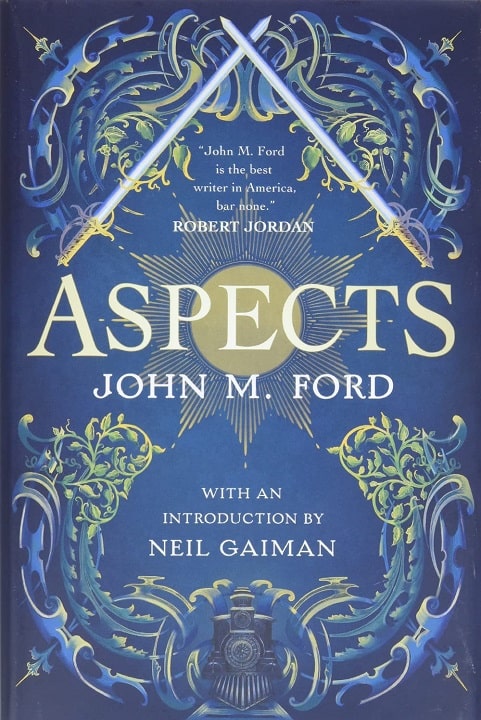 |
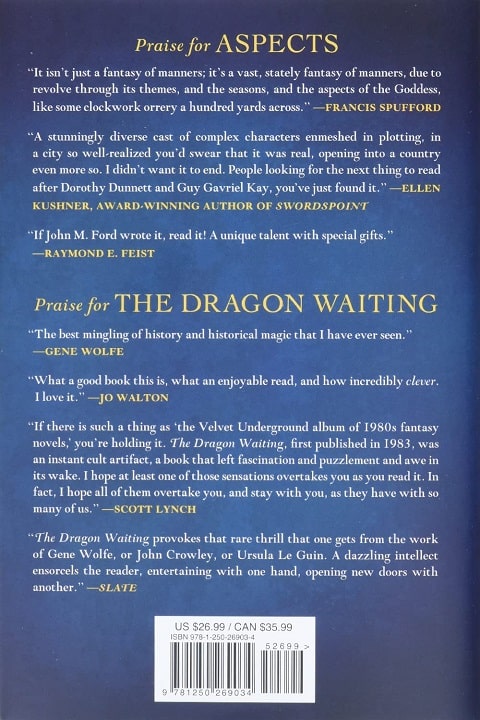 |
Aspects by John M. Ford (Tor Books, April 5, 2022)
John M. Ford died in 2006, not yet 50 years old. He had been publishing SF, Fantasy, poetry, games and nonfiction for some three decades, and his fiction was gaining a reputation, for originality, intricacy, beauty, and cleverness; but he was still not truly widely known. Still, novels like The Dragon Waiting and stories like “Mandalay” (the first John M. Ford work I really noticed), “Walkaway Clause,” “Fugue State,” and “Erase, Record, Play” were highly respected by the cognoscenti. And on places like the Usenet newsgroup rec.arts.sf.written I heard his friends mention a huge novel he was working, to be called Aspects — all I knew about it was that it was partly about trains (a favorite subject of Ford’s.)
But when he died, everything stopped. His heirs had no connection to the SF world, his agent left the field, and his works fell out of print. People knew that Aspects, unfinished, existed in some form, but hopes for any movement towards publishing it seemed pointless. But in 2019, a journalist named Isaac Butler got interested in his case, and found his heirs, leading eventually to plans to republish his existing works. The Dragon Waiting appeared from Tor in 2020, The Scholars of Night in 2021. And now, in 2022, we have Aspects — his big unfinished novel.
Is it worth it? Oh Goddess yes!
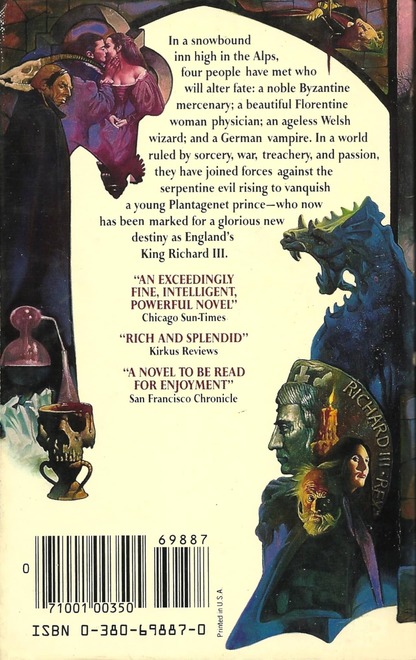 |
 |
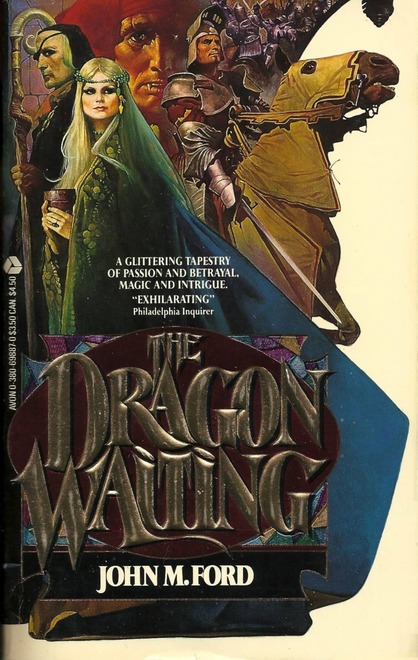 |
The Dragon Waiting by John M. Ford (Avon paperback edition, June 1988). Cover by Sanjulian
It is an intensely enjoyable novel, beautifully written, lovingly detailed, deeply intelligent and deeply wise. And it is also in a way a painful experience — it is so very good, and what we have is finished prose — but the novel simply comes to an end… and I so wish I could see where it would have led us! Apparently he planned multiple books in this world, and it’s not clear to me how much more was intended before Aspects itself was finished. At least one long chapter, I’d say (50 pages or so) and I suspect even more. But as I say, what we have is glorious, lovely, moving, endlessly interesting.
The novel opens with a duel, clearly a trumped-up affair. A man named Varic — the Coron Varic — is fighting a young soldier; and we gather soon enough that Varic is a significant figure in politics, and that very possibly his enemies have put this young man up to challenging him… the business concludes (I won’t say exactly how) and Varic continues to Parliament, and to his friend and mentor Brook.
The two are, we learn, leading the effort to reform the constitution of their Republic of Lescoray. And what follows is a description of a day in Parliament, with a couple of significant measures to be considered, and also the minor matter of a request from the Coron Longlight, from a remote Western Coronage, for help dealing with the bandits in her country.
All this may seem ordinary enough, and interesting. Coron Varic and Coron Longlight unexpectedly (to each of them) take a considerable interest in the other — so a love story is set up. And Parliament is about to enter recess for the Equinox.
The next sequence is set mostly on a train. Longlight has some difficulty finding a compartment. Varic sees her by chance, and also his friend Silvern. Silvern and he are going to Strange House for the Equinoctials… this is an old country house owned by very old man named Strange, and there is a diverse set of regular guests.
Varic maneuvers things so that Longlight gets a compartment on the train going that direction, and so that he and Silvern share one. And over a couple of days they convince Longlight to spend the Equinoctials at Strange House. Of course, Varic does not spend the nights in his and Silvern’s compartments — and the scenes with Longlight are intense and beautiful sex scenes without really any description of sex.
The long interlude at Strange House is perhaps the true engine of the book. The focus remains to some extent on Varic and Longlight, but we spend time with each of the guests and the hosts: Strange, the unusually old man; his companion Dany; Silvern and his conseil Edaire; a thief/trickster named Winterhill; Agate, whose Craft is poetry and who can be hurt by bad music, bad poetry — and only Varic can give her peace; Birch, a newly elevated Archimage (a sort of Bishop); Reccan, a mute woman rescued from service to a thief — and the servants too. (One minor complaint I might have had is that the classes as depicted seem just a bit too content with their class divisions – though clearly there is at least some impetus towards reform.)
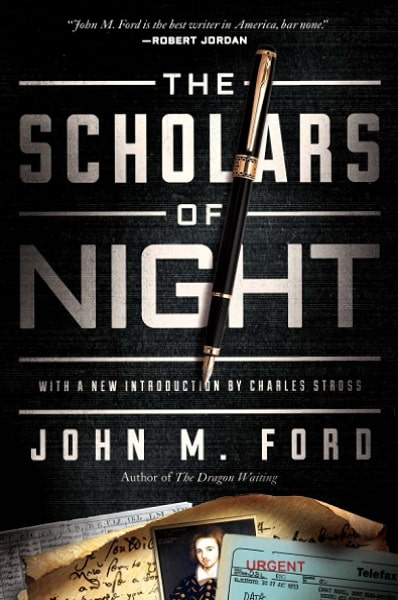 |
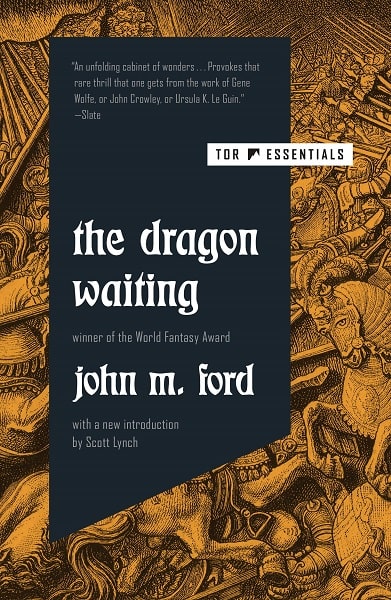 |
 |
John M. Ford reissues from Tor: The Shape of Night (Tor Trade, September 2021), and the Tor Essentials
editions of The Dragon Waiting (September 2020) and the upcoming Growing Up Weightless (September 27, 2022)
The narrative smoothly runs from one character to another; from one event to another — a visit to the Dark Room, a game (Ford’s fascination with gaming showing through), fencing matches, magical illuminations, a fascinating sort of costumed play or masque… it’s a very long beautiful chapter, some of the most absorbing sweet slow storytelling I’ve read.
The plot continues — a health crisis for Brook calls Varic back to the capitol, and there he is drawn back into various intrigues; while Longlight returns to her home Coronage with Silvern, ready to make a survey of potential — hunting lodges? Ironway routes? Points to improve bandit defense?
And then, alas, the novel ends — fairly abruptly, though we are gifted 5 sonnets that hint obliquely at some of what may happen to the characters later in the novel, or in the series. This ending is hopelessly poignant. I tell you truly — had Ford been granted the time to finish this novel, we may be regarding it now from the perspective of maybe a decade as one of the great fantasies of the millennium to date, a book to stand, say, with Jonathan Strange & Mr Norrell. As it is, we have this substantial unfinished work, which throughout its length gives immense pleasure.
It is at times a book of Wisdom, I think, in the sense of Biblical era Wisdom literature. (That is, it is partly telling us, or showing, “How to live,” “How to love,” “How to rule,” “How to be friends,” etc.) It is, as I said, an involving love story.
I was reminded of “K. J. Parker” (Tom Holt), or indeed Neal Stephenson, in the fascination with the way things work — and the way systems work. Also recalling Parker in a way is the alternate fantastical history of this realm, clearly modelled on Great Britain, set in a rough analog of the 18th Century, but looking back to an analog of “Classical” antiquity, with Quercians and Pandekts standing in for Romans and Greeks.
It is about Story, and stories — numerous old stories are told by the characters, and they really work. It is full of poetry — Ford was a poet, and a good one, and there is poetry throughout — a lovely villanelle sneaks in early, there are the sonnets heading each chapter, and more snippets everywhere. It is about politics, and justice, and how to make trains work. It is about food. About clothes. About language. About conversation. I was brought to tears (not of sadness — of wonder, of awe, of joy) at multiple places.
What to do now? Reread John M. Ford’s oeuvre, I suppose!
Rich Horton’s last article for us was a review of Saint Death’s Daughter by C. S. E. Cooney. His website is Strange at Ecbatan. Rich has written over a hundred articles for Black Gate, see them all here.
I so want to read this unfinished novel, even with the fear of slamming into the wall of its abrupt termination. I feel that I owe it to the person who wrote The Yellow Clearance Black Box Blues for the cynically satirical roleplaying game Paranoia. Oh, and his novel The Last Hot Time was pretty good (and sexy!), too. And How Much for Just the Planet? really puts the “opera” into “space opera” with the Star Trek gang. Unless you want to go more serious with them Klingons in his novel The Final Reflection, no longer deemed canonical but still very good. And you all know The Dragon Waiting, so no need to mention that one. And where the heck is my copy of Growing Up Weightless?
The The Yellow Clearance Black Box Blues dragged me into the world of Ford as well.
Somehow I missed reading his fiction, but I still; remember the poem he wrote in response to September 11th. It was staggering.
::googles around a little::
Oh, here it is:
“110 Stories”
http://nielsenhayden.com/110.html
Yes, that’s quite a poem. He really was a true poet and well as a wonderful prose writer. I also love his poem “Winter Solstice, Camelot Station”, which I wrote about here on Black Gate.
So of course I had to track down *that* poem, and then I was hours down the rabbit hole and through Y Mabinogi until I landed in this marvelous interview with Alan Garner, who has made me feel much less alone about my writing process. Thank you for a lovely evening!
https://d.lib.rochester.edu/camelot/text/interview-with-alan-garner
Which reminds ME that I need to reread Alan Garner — it’s been a long time and some of it I wasn’t ready for.
I have a stack of borrowed paperbacks pressed on me by a wise friend who foresaw that I would need to read him.
My monthly sf/f group read The Owl Service last year, and since it was short enough, I snuck in a re-read of all of Mr. Garner’s notable 1960s fantasies (The Weirdstone of Brisingamen, The Moon of Gomrath, Elidor) along with our selection. They all hold up, and now I find myself needing to read his continuation of the Alderley Edge (Weirdstone, Gomrath narrative, with a mature Colin in Boneland (which, alas, the local library system has not shelved anywhere among its 83 member and/or branch libraries).